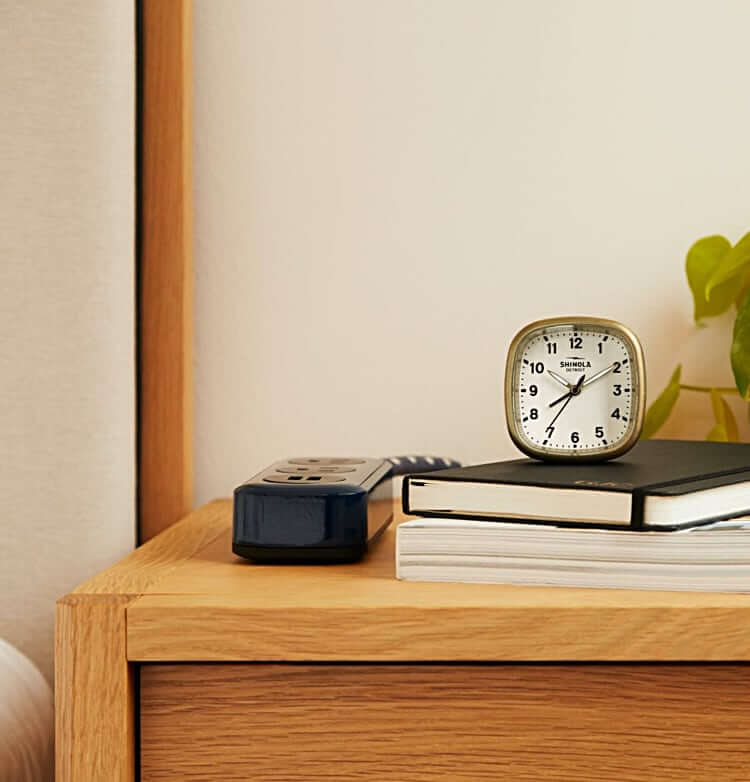
Can’t
Sleep?
You’re not alone. Here’s how to get back to a restful night’s sleep.

Guardian brass alarm clock, $125 by Shinola
When the coronavirus pandemic brought our world to a crashing halt, it threw our collective schedules out of whack. We weren't working the same way, nor were we shopping or working out like we were before. And we certainly weren't sleeping the way we used to. Many of us complained of bizarre dreams, while others suffered from sudden insomnia or trouble staying asleep.
According to a recent study by SleepHelp.org, nearly 25% of Americans have had a poorer quality of sleep since last March. About a third said their sleep troubles stemmed from the news coverage they consumed, while others simply pointed to the disruptions of their daily routines. Which is why sales of melatonin are up 44% over last year, along with a nearly 15% jump in sleep medication prescriptions, according to data found by the Wall Street Journal. Because, of course, sleep is a key pillar to your overall health.
To understand why sleep is so important for your body, you need to know what happens to your body while you're asleep. Breathing slows, body temperature and blood pressure drop, while your muscles relax and rebuild. Your body produces and regulates hormones. The stress hormone, cortisol, dips, while ghrelin and leptin (which regulate hunger and satiety) balance out. So to keep your brain sharp, your metabolism firing and your immune system fighting off infection, you want to be clocking the recommended seven hours of quality sleep each night. Here's how to make that happen.
Your Better Sleep
Game Plan

Sticking to

Going to bed and getting up at the same time each day is critical to training your body to adapt to better sleep, says Dr. Philip Muskin, a sleep specialist at Columbia University Medical Center in New York. Limit the difference in your sleep schedule on weeknights and weekends to no more than one hour. The consistency reinforces your body's sleep-wake cycle. He says that napping can interfere with that cycle, so it's best to avoid them when you're experiencing sleep troubles.
Manage
your stress
This one is difficult during a global pandemic and nationwide protests. But a running or worried mind is the enemy of sleep. Try to resolve immediate concerns before turning in for the night by jotting down what's on your mind, along with any to-dos that are floating around your head. Then set it aside for tomorrow. Put your phone away. The blue light may or may not be problematic, but social media doesn't do you any favors in the hour before bed. Consider a quick 15-minute meditation to help quiet your mind before laying down.

Watch what you
eat and drink

If you've been having trouble sleeping, cut off any caffeine after noon. Even if you don't think caffeine effects you. It's been shown that when consumed late in the day, the chemical stimulates your nervous system and may stop your body from naturally relaxing at night. And while alcohol might make you feel sleepy, it can disrupt sleep later in the night, causing you to repeatedly wake up. When it comes to food, Dr. Charles Czeisler of Harvard Medical School recommends a light, early dinner—too much food too late will force your body to work overtime, forcing the digestive system into action when it should be resting.
Get outside and get active
Not surprisingly, regular physical activity will bring about better sleep. Avoid being active too close to bedtime, however, since it'll get your heart racing and raise your blood pressure and body temperature. Natural sunlight or bright light during the day helps keep your circadian rhythm healthy. This improves daytime energy, as well as nighttime sleep quality and duration. A Cornell University study found that in people with insomnia, daytime bright light exposure improved sleep quality and duration. It also reduced the time it took to fall asleep by 83%.
Know when to call it

If you’re tossing and turning, fight the tendency to stay in bed. Get up and do something relaxing. Stay up until you’re sleepy, then return to bed. According to the American Sleep Association, this promotes healthier sleep and makes the bedroom a welcome sight instead of a frustrating torture chamber.





